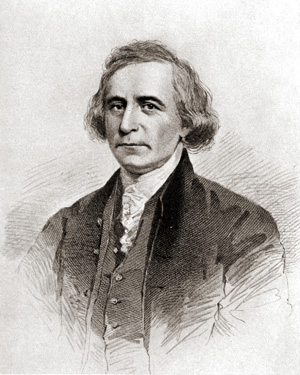The Battle of Stonington
Philip Freneau
ON THE SEABOARD OF CONNECTICUT
In an attack upon the town and a small fort of two guns, by the Ramillies, seventy-four gun ship, commanded by Sir Thomas Hardy; the Pactolus, 38 gun ship, Despatch, brig of 22 guns, and a razee, or bomb ship.—August, 1814.
Four gallant ships from England came
Freighted deep with fire and flame,
And other things we need not name,
To have a dash at Stonington.
Now safely moor'd, their work begun;
They thought to make the yankees run,
And have a mighty deal of fun
In stealing sheep at Stonington.
A deacon, then popp'd up his head
And parson Jones's sermon read,
In which the reverend doctor said
That they must fight for Stonington.
A townsman bade them, next, attend
To sundry resolutions penn'd,
By which they promised to defend
With sword and gun, old Stonington.
The ships advancing different ways,
The britons soon began to blaze,
And put th' old women in amaze,
Who fear'd the loss of Stonington.
The yankees to their fort repair'd,
And made as though they little cared
For all that came—though very hard
The cannon play'd on Stonington.
The Ramillies began the attack,
Despatch came forward—bold and black—
And none can tell what kept them back
From setting fire to Stonington.
The bombardiers with bomb and ball,
Soon made a farmer's barrack fall,
And did a cow-house sadly maul
That stood a mile from Stonington.
They kill'd a goose, they kill'd a hen,
Three hogs they wounded in a pen—
They dash'd away, and pray what then?
This was not taking Stonington.
The shells were thrown, the rockets flew,
But not a shell, of all they threw,
Though every house was full in view,
Could burn a house at Stonington.
To have their turn they thought but fair;—
The yankees brought two guns to bear,
And, sir, it would have made you stare,
This smoke of smokes at Stonington.
They bored Pactolus through and through,
And kill'd and wounded of her crew
So many, that she bade adieu
T' the gallant boys of Stonington.
The brig Despatch was hull'd and torn—
So crippled, riddled, so forlorn,
No more she cast an eye of scorn
On th' little fort at Stonington.
The Ramillies gave up th' affray
And, with her comrades, sneak'd away—
Such was the valor, on that day,
Of british tars near Stonington.
But some assert, on certain grounds,
(Besides the damage and the wounds)
It cost the king ten thousand pounds
To have a dash at Stonington.
During the War of 1812, the British navy attacked the town of Stonington. The British bombarded the town for three days, but killed nobody.
